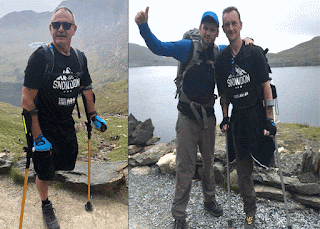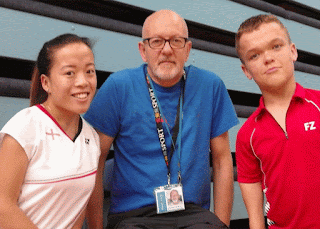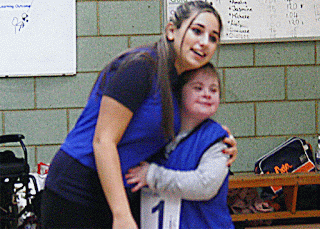I’m interested in how we use words to describe and define
things in our society. I’ve been working as a Disability Sports Coach for several
years and deliver disability awareness training and coaching workshops designed
to help young coaches engage more effectively with people with disabilities.
At some point during a training session or workshop we will inevitably cover the subject of communication and labels. I do an exercise with two headings- Acceptable or Not-Acceptable. I then hand out small cards printed with the names of the usual suspects: wheelchair user, wheelchair bound, blind, visually impaired, autistic, retarded etc., etc. I ask the participants to put the cards under the heading they think are most appropriate. The exercise is always very popular with some descriptions and definitions more obvious than others.
At some point during a training session or workshop we will inevitably cover the subject of communication and labels. I do an exercise with two headings- Acceptable or Not-Acceptable. I then hand out small cards printed with the names of the usual suspects: wheelchair user, wheelchair bound, blind, visually impaired, autistic, retarded etc., etc. I ask the participants to put the cards under the heading they think are most appropriate. The exercise is always very popular with some descriptions and definitions more obvious than others.
One that often confuses people is Dwarf. Some put that under the Not-Acceptable heading even though the term Dwarf has been used as a category in various Para Sport events for years. Language is constantly changing and now the term short statue is often substituted. Some people of “Short Statue” are perfectly used to and take no offence to the word Dwarf.
 One of my favourite and most common example, is a toilet Accessible
or Disabled? Of course, we all know, don’t we boys and girls, that the correct
term is Accessible since a Disabled Toilet is a toilet that is Out of Order?
One of my favourite and most common example, is a toilet Accessible
or Disabled? Of course, we all know, don’t we boys and girls, that the correct
term is Accessible since a Disabled Toilet is a toilet that is Out of Order? I shy away from the term “disabled person” preferring to use “a
person or persons with a disability”. However, many organisations suggest we should
use the phrase “disabled person”. My
work brings me into contact with Special Needs children and when I hear a child
described as a “physically disabled boy or girl,” I feel that It places the
emphasis too much on the disability, suggesting that their differences are the only
things we need to know about them.
I shy away from the term “disabled person” preferring to use “a
person or persons with a disability”. However, many organisations suggest we should
use the phrase “disabled person”. My
work brings me into contact with Special Needs children and when I hear a child
described as a “physically disabled boy or girl,” I feel that It places the
emphasis too much on the disability, suggesting that their differences are the only
things we need to know about them.
Labels are not the problem. The dictionary defines label as “a descriptive word or phrase applied to a
person, group, theory, etc., as a convenient generalized classification”
However in a world that is becoming ever more politically correct, with new
definitions such as “able-disabled,
differently-abled, handi-capables, and
people with differing abilities”, does calling someone a person with a
disability, really make any difference? After all, presumably they know that
they are a person; they don’t need us to tell them.
Does what we call a person result in them being treated with
any more understanding? Perhaps changing attitudes and assumptions is what we
should strive for rather than being so preoccupied with labels. Of course, changing
attitudes and values is a much more difficult task than simply changing
language. Perhaps that is why we “able bodied”, sorry, “non-disabled” people spend
so much time agonising over labels, definitions and descriptions.
Changing the label, we use to identify or classify a person’s
disability won’t lessen the impact of their disability. Changing Societies
attitudes just might.


No comments:
Post a Comment